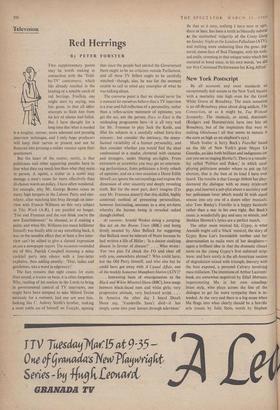Television
Red Herrings
By PETER FORSTER But the heart of the matter, surely, is that politicians and other appearing pundits have to fear what they say much less than what they seem in person. A squint, a stutter or a scowl may damage a man's cause far more effectively than ill-chosen words on policy. I have often wondered, for example, why Mr. George Brown raises so many high tempers in the Labour Party and else- where; after watching him bray through an inter- view with Francis Williams on this very subject in This Week (A-R), I am puzzled no longer. `You and Freeman and the rest think you're the new Establishment I ' he shouted, as if making a point, and when Mr. Williams (no mean bulldozer himself) was finally able to say something back, it was to the sensible effect that at least a live inter- view can't be edited to give a slanted impression as can a newspaper report. The occasion reminded me of Mrs. Patrick Campbell stunning a noisy cocktail party into silence with a four-letter expletive, then adding sweetly : 'That, ladies and gentlemen, was a word in edgeways!'
The fact remains that sight counts for more than sound, a truism so basic it is often forgotten. Why, reading of his motion in the Lords to bring in governmental control of TV interviews, one might have been tempted to take Milord Teviot seriously for a moment, had one not seen him, looking like C. Aubrey Smith's brother, making a most noble ass of himself on Tonight, opining that since the people had elected the Government there ought to be no criticism outside Parliament, and all these TV fellers ought to be carefully watched—though, alas, he was for the moment unable to call to mind any examples of what he was talking about.
The converse point is that we should never for a moment let ourselves believe that a TV interview is a true and full reflection of a personality, rather than a reflex-action statement of opinions; you get the act, not the person. Face to Face is the misleading programme here—it is all very well for Mr. Freeman to play Jack the Knife, and fillet his subjects in a carefully edited forty-five minutes: but consider the intricacy, the many- faceted variability of a human personality, and then consider whether you would find the ideal confessional in a studio, cluttered with cameras and strangers, under blazing arc-lights. From extroverts or eccentrics you may get an entertain- ing performance, from politicians a lively rehash of opinions, and on a rare occasion a Dame Edith Sitwell can ignore the surroundings and impose the dimension of utter sincerity and deeply revealing truth. But for the most part, don't imagine (I'm sure Mr. Freeman doesn't) that this skilful, highly contrived method of presenting personalities, however fascinating, amounts to a tieNN art-form whereby the human being is revealed naked though clothed.
At random: Arnold Wesker doing a jumping- flea act on the Brains Trust (BBC) and being firmly swatted by Alan Bullock for suggesting that Bullock must be tolerant of Nazis because he had written a life of Hitler : 'Is a doctor studying disease in favour of disease?' . . . Who wrote : `For two pins I'd chuck the FO and clear off with you, somewhere abroad'? Who could have, but the Old Party himself, and who else but he could have got away with A Casual Affair, one of the weekly Somerset Maugham Stories (ATV)? . . . Interesting basis of miscegenation to the Black and White Minstrel Show (BBC), love songs between black faced men and white girls; very progressive attitude, very backward script. . . . in America the other day 1 heard Dinah Shore say, 'Vaudeville hasn't died—it has simply come into your homes through television.' Be that as it may, nothing 1 have seen in ages, there or here, has been a tenth as blessedly natural as the unabashed vulgarity of the Crazy Gang on Sunday Night at the London Palladium (ATV), and nothing more endearing than the great, jilt' eared, moon-face of Bud Flanagan, with his wide. sad smile, crooning in that unique voice which has matured in bond since, in his own words, 'we did our first Command Performance for King Alfred.'










































 Previous page
Previous page